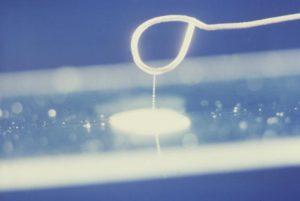
Droplets of sample of suspected colonies of Vibrio cholerae bacteria (Public Health Image Library, CDC, Image ID:3909)
Although the mucosa forms one of the largest parts of the immune system, little was known about immunological memory in the mucosa and how it is able to protect against disease. It had even been suggested that there is no immune memory in the mucosa. However, a team at the Sahlgrenska Academy in Sweden have disproved this theory and have shown that the mucosa has a unique immunological memory.
For a vaccine to protect mucosal tissues it needs to be administered directly through the mucosa, for example orally or through a nasal spray. Muscosal protection is potentially important for vaccines against disease such as HIV whose first contact is the mucosal tissue.
The researchers used mouse models to determine whether the gut mucosa of mice developed lifelong immunity after immunisation with NP hapten conjugated with cholera toxin. They found that post-immunisation, long-lived mucosal IgA memory cells were produced. The memory cells were not closely related to long-lived plasma cells as would have been expected. They were also less affinity matured. While systemic memory cells were mostly IgM+, the mucosal memory cells were IgA+.
Once the memory response was triggered, the memory B cells were GL7-negative. GL7 is a germinal centre marker. However, these memory B cells do expand in the germinal centres, undergoing affinity maturation. Another characteristic of the memory B cells is CCR9 expression which is necessary for gut homing.
This study suggests that it is possible for mucosal surfaces to achieve immunological memory and therefore, creating effective mucosal vaccines is realistic and achievable. The immune memory cells created in the mucosa are different to those found in systemic infection and cannot be achieved by vaccination strategies other than ones that are directly targeted at these surfaces.
Journal Article: Bemark et al., 2016. Limited clonal relatedness between gut IgA plasma cells and memory B cells after oral immunization. Nature Communications
Article by Thandeka Moyo











